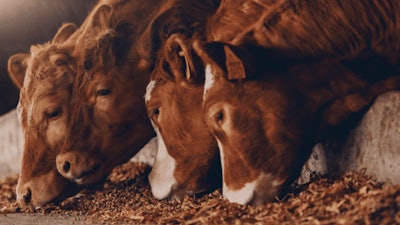
The allowance of hemp in animal feed is still an issue for debate, according to the Association of American Feed Control Officials (AAFCO) and similar organizations.
In early February, AAFCO released a joint open letter of concern to agricultural leaders and policymakers, addressing the need for further education and research to ensure the use of hemp in animal feed is safe. Seventeen organizations have signed the letter.
“We understand the importance of supporting the hemp industry, and yet we also believe it is simply too soon to know whether hemp is safe for farm and ranch animals, as well as for our pets,” AAFCO said. “Our goal is for more research to ensure the safety and well-being of the public, our animals, and our agricultural industry.”
The organization also voiced a need to establish proper safety mechanisms and procedures, and mentioned three specific concerns on the use of hemp in animal feed: the health and safety of animals, consumers’ safety when eating food produced from animals fed hemp, and any potential legal implications on the animal feed industry, farmers, and ranchers.
A Call for Research
AAFCO said it’s aware that research on the use of hemp in animal feed is underway but said it is “limited and not conclusive.”
RELATED: AAFCO Calls for More Research Into Hemp as Livestock Feed
“Some parts of the hemp plant have the potential to serve as sources of nutrition in many animal diets. However, it is not yet clear whether animals fed hemp-based diets will perform similarly to animals fed traditional diets that farmers and ranchers depend on today. Even hemp that is compliant with existing regulations for production contains [0.3% or less of delta-9 THC] and other cannabinoids,” AAFCO said, adding that the potential long-term effects these compounds may have on animals is not clear.
AAFCO also noted that the research on the transfer rate of these cannabinoids into meat, milk, and eggs of food-producing animals is lacking.
“The laboratory methods needed to detect these compounds are still under development,” AAFCO said, adding that appropriate research on this topic needs to be conducted to protect consumers from possible, unwanted exposures to cannabinoids exceeding the 0.3% delta-9 THC limit.
Furthermore, the organization stressed the need for federal review and approval on the use of hemp in animal feed, adding that without it, “the access for producers and manufacturers to interstate and global markets can be negatively impacted.”
Recommendations
Moving forward, AAFCO recommends state leaders and advocates to establish and define regulatory pathways used for each animal feed ingredient.
“We urge state leaders to support research through universities or private labs so that the safety and utility of hemp can be fully understood before it is allowed for commercial purposes,” AAFCO said. “We encourage proponents to continue to assemble data and to work on submitting applications through the established animal feed ingredient review process. AAFCO is committed to working with any organization to submit an application for federal review.”

























